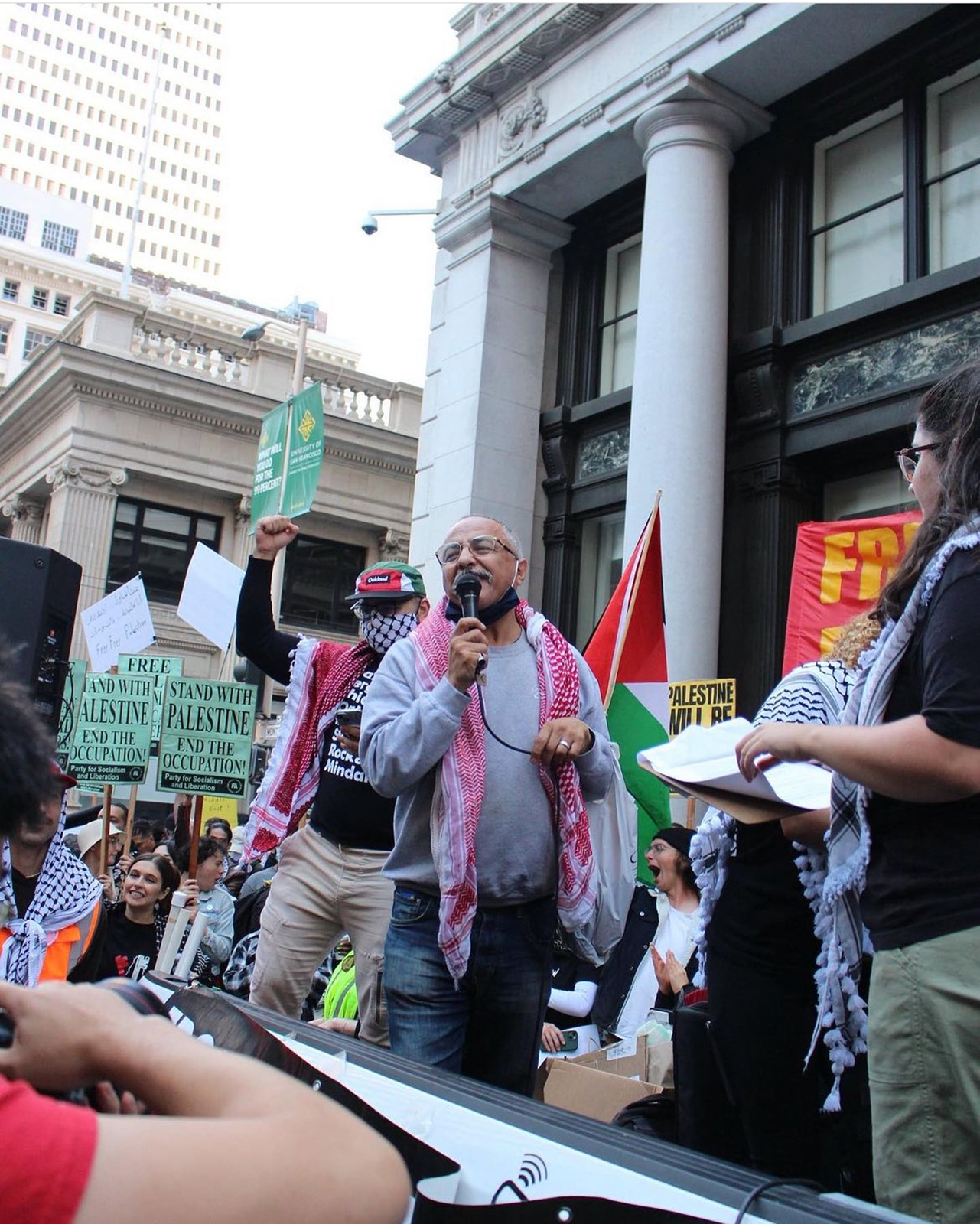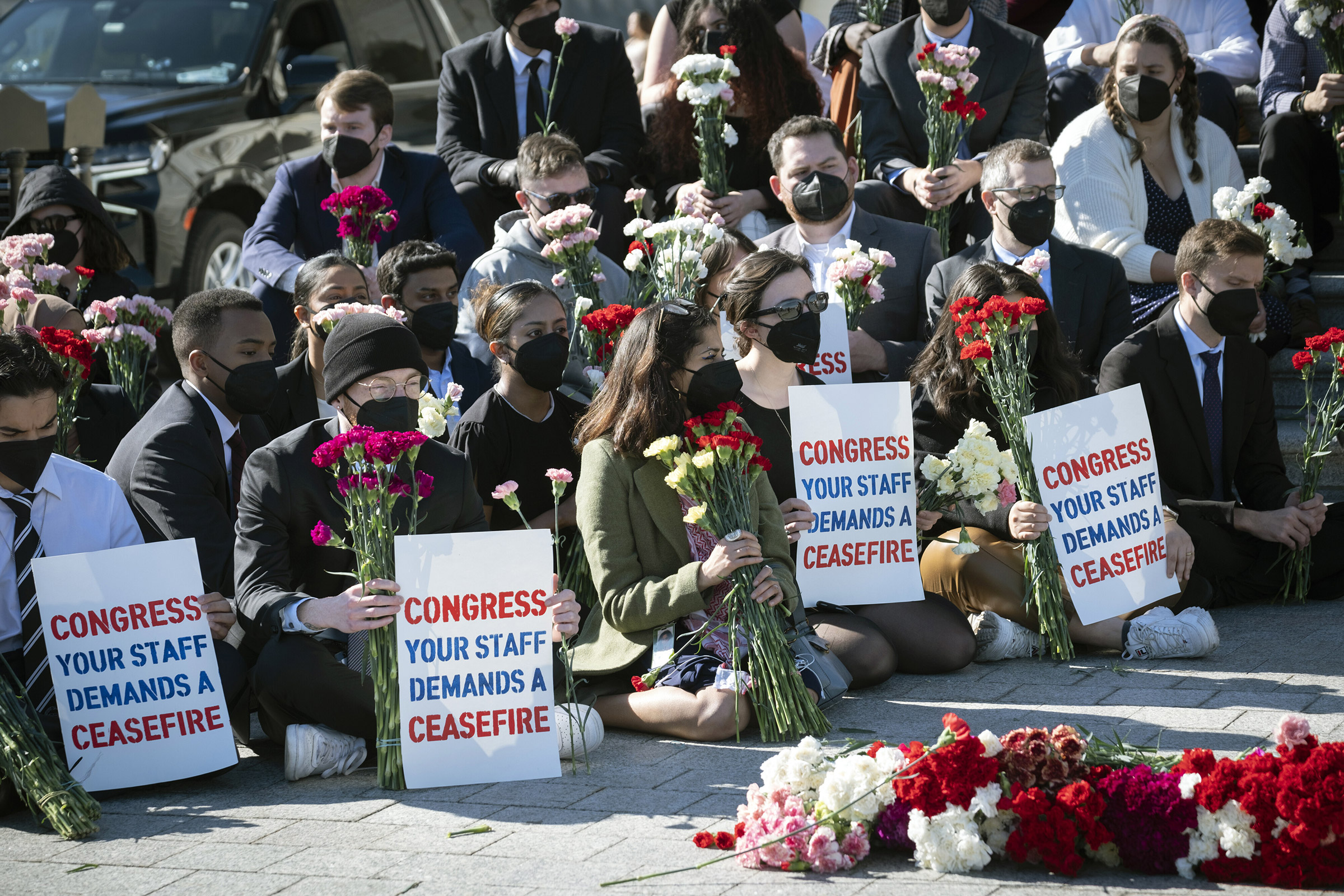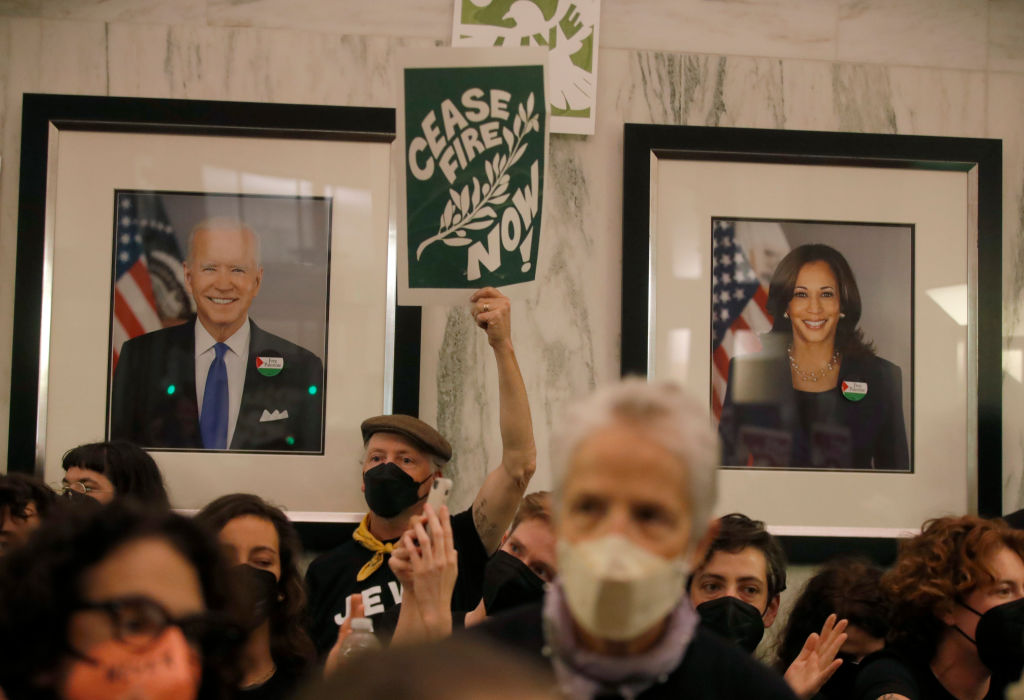After Israel’s assault on Gaza killed five members of Monadel Herzallah’s family, he decided to sue President Joe Biden. Herzallah—a U.S. citizen—had already taken part in protests and written to his representatives. This felt like the logical next step. “We have exhausted every possible way we can raise our voice,” he says in an interview with TIME. “They did not stop the genocide.”
On Nov. 13, Palestinians in Gaza and the U.S.—aided by the Center for Constitutional Rights—sued Biden, Secretary of State Antony Blinken, and Secretary of Defense Lloyd Austin. The lawsuit aims to stop the U.S. from providing more arms, money and diplomatic support to Israel, on the grounds that the U.S. is legally obliged to avoid facilitating an ongoing genocide.
A genocide scholar, William Schabas, wrote in a declaration in the lawsuit that he believes there is a “serious risk of genocide” and the U.S. is “in breach of its obligation” under the 1948 Genocide Convention and customary international law. (Academics disagree on whether Israel’s assault of Gaza constitutes genocide, but last week, three dozen U.N. experts said, “grave violations committed by Israel against Palestinians in the aftermath of 7 October, particularly in Gaza, point to a genocide in the making.”)

Biden is facing intense heat over his administration's Israel policy, not only in court, but from voters and dissenting staffers in Congress and at federal agencies. The president is pushing to supply Israel with an additional $14 billion in military aid and has said there are “no red lines” when it comes to American support for Israel. The White House has so far said that they have a rigorous process for evaluating whether a country has committed genocide and that Israel’s actions do not fit that definition.
Israel’s attacks on Gaza have killed more than 11,000 Palestinians, per the city’s health ministry. They follow an Oct. 7 Hamas attack that killed more than 1,200 Israelis and took more than 200 hostages.
More From TIME
Massive pro-Palestinian protests have swept major U.S. cities, and Biden’s approach to Middle East policy may cost him significantly ahead of the presidential election. While Arab and Muslim communities don’t make up a large percentage of the electorate, they have a disproportionate influence in key battleground states—particularly Michigan, says Youssef Chouhoud, an assistant professor of political science at Christopher Newport University, an expert in Muslim minorities in the West. “When you factor in how close that gap has been between the winner and the loser in presidential elections in swing states, any kind of decrease in support could prove pivotal,” he says.
The first national poll of Arab Americans since the war in Gaza began showed a staggering drop in the percentage willing to vote for Biden in 2024—only 17%, compared to 59% in 2020. But it’s not just Muslims and Arab Americans that Biden could lose; young Americans are also “disillusioned” by his “deferential attitude towards Israel,” Chouhoud says. The latest national NBC News poll finds that more than two-thirds of voters ages 18 to 34 disapprove of Biden’s handling of the war.
Last month, more than 400 congressional staffers signed an open letter calling for a ceasefire and the release of Israeli hostages. The signatories were predominantly Muslim and Jewish but signed anonymously out of fear that it could endanger their personal safety and their employment. “Nationwide and in Congress, the voices calling for de-escalation and peace have been drowned out by those beating the drums of war. As Muslims and Jews, we are tired of relieving generational fears of genocide and ethnic cleansing,” the letter stated.
“For us to be complicit and actively support Israel with taxpayer money is wrong,” a staffer in a Democrats’ office who signed the letter tells TIME. They requested anonymity for fear of losing their job. The staffer also pointed out inflammatory rhetoric on the Hill that went unpunished, such as members comparing Palestinians to Nazis and talking about flattening Gaza. She says one staffer in another office had been told to let constituents calling for a ceasefire to go to voicemail. “Some (lawmakers) don’t even realize that their constituents are impacted and have family overseas,” she says.

More than 100 congressional staffers participated in a walk-out earlier this month. They spoke from the steps of the U.S. Capitol, affirming solidarity with Palestinian and Israeli victims and placing more than 10,000 carnations on Capitol grounds to signify the mounting Palestinian death toll. “The walkout was a statement to Congress…and the world that we see Palestinians, we see their humanity, we see their dignity,” the staffer says. She noted that Congress members had held two vigils to mourn the Israelis killed on Oct. 7, “without a humanizing mention of Palestinians, even as the death toll soared.”
And on Nov. 2, more than 1,000 staff working for USAID anonymously signed an open letter calling for a ceasefire. USAID is tasked with providing humanitarian aid to Gaza, which has been made harder by Israel’s blockade. More than two-thirds of the city’s hospitals have shut down because of a lack of fuel or damage from airstrikes, according to Gaza’s health ministry. About 70% of the population does not have access to clean water, per the U.N. Relief and Works Agency. Sewage is flowing in Gaza’s streets and dead bodies remain under the rubble, raising the risk of infectious disease.
One of the letter signers, who also requested anonymity, tells TIME that “there is a really large amount of staff who are extremely frustrated” by the U.S. policy stance. Even after the letter, no serious policy discussions have been held for staffers to partake in, she says.
She and other colleagues have been questioning working for the government—particularly after a State Department official who oversees arms transfers resigned in protest.
Dozens of State Department employees have also sent dissent cables over Biden’s Gaza policy. Blinken has told employees that they are “listening” to those who “disagree with approaches we are taking,” the Washington Post reported. Last week, more than 500 political appointees and staff members across roughly 40 government agencies wrote to Biden, protesting his support of Israel’s military actions, the New York Times reported.

In the meantime, the Center for Constitutional Rights is focused on proving U.S. culpability in supporting Israel’s campaign. “You cannot breach fundamental principles of international law in the name of self defense,” says Katherine Gallagher, a senior attorney at the Center for Constitutional Rights and one of the lawyers who brought the case.
Palestinians in Gaza and those with relatives in the besieged territory who signed onto the lawsuit describe a dire situation. Airstrikes have destroyed their homes and killed loved ones. Families are splitting children up between parents to increase the chances that some survive if one group gets killed. They are finding it difficult to access clean water and food.
The lawsuit also details a series of inflammatory statements made by Israeli officials in building a case to prove intent tied to genocide. This includes remarks dehumanizing Palestinians as “human animals,” promising to “eliminate everything” and making sure the “emphasis is on damage and not accuracy.” The lawsuit goes back decades in an effort to establish a pattern of Israeli aggression—highlighting five previous bombing campaigns and ongoing occupation, which is illegal under international law.
Herzallah is mourning a niece, two nephews and three cousins; the youngest a 4-year-old girl, Ward. (Her name means “flower” in Arabic.) The father of the two nephews—Herzallah’s cousin—won’t take his calls. “I’ve been trying to call him just to comfort him,” he says. “He hasn’t been talking to anybody.”
Herzallah came to the U.S. after high school and hasn’t been to Gaza since the mid-’70s. He feels survivors’ guilt all the time. “We eat and we have a roof over our head and enjoy being secure… I wish I could go there at any minute right now.”
Last week—after Herzallah filed the lawsuit—Israeli attacks killed his 20-year-old nephew. The nephew’s two brothers were also victims of Israeli attacks; one was killed in late October and another was killed during the 2009 war, he says. After the 2009 killing, Herzallah protested in front of the Israeli consulate in San Franscisco. “We blocked the entrance and we said there is no business as usual,” he says. A few weeks ago, he returned to the same spot to protest.
Correction, Nov. 21: The original version of this story misstated in one instance the name of the organization that helped file the lawsuit against President Joe Biden. It is the Center for Constitutional Rights, not the Center for Constitutional Justice.
More Must-Reads from TIME
- Donald Trump Is TIME's 2024 Person of the Year
- Why We Chose Trump as Person of the Year
- Is Intermittent Fasting Good or Bad for You?
- The 100 Must-Read Books of 2024
- The 20 Best Christmas TV Episodes
- Column: If Optimism Feels Ridiculous Now, Try Hope
- The Future of Climate Action Is Trade Policy
- Merle Bombardieri Is Helping People Make the Baby Decision
Write to Sanya Mansoor at sanya.mansoor@time.com